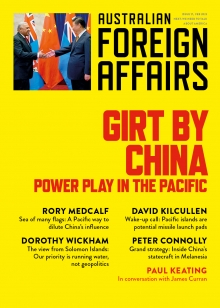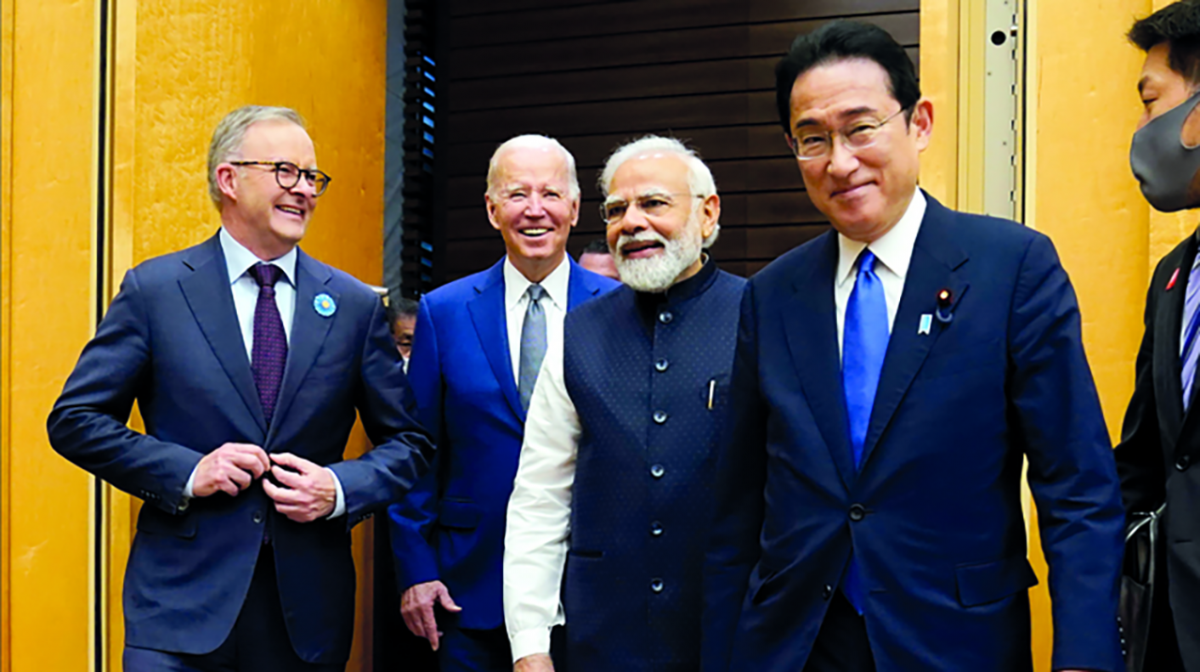
This extract is featured in Australian Foreign Affairs 17: Girt by China.
To read the full issue, log in, subscribe or buy the issue.
Vafa Ghazavi on Why Australia Needs a Strategy to Counter Global Corruption
“An anti-corruption strategy would signal that Australia is not open to corrupt wealth, and would link countering corruption to Australia’s commitment to a rules-based order.”
THE PROBLEM: Elite corruption and kleptocracy – rule by thieves – intensifies Australia’s international challenges. It deepens inequality, entrenches political repression, makes governments vulnerable to foreign interference, emboldens autocrats and undermines international peace, as Russia’s invasion of Ukraine highlighted. The idea that countries have a right to rule themselves, free from external coercion, is central to Australia’s foreign policy – but kleptocrats also stop a citizenry from determining its own future, imposing elite control from within. The positive impact of Australia’s partnerships in Asia and the Pacific, including in areas such as infrastructure development, shrinks when corrupt elites skew local priorities.
Systemic corruption is often associated with poorer countries, but the wealth stolen by elites is generally concealed in advanced economies: think London real estate, Swiss bank accounts, American hedge funds. Australia and its democratic partners should not seek to export democracy or meddle in the affairs of other nations, but they have a responsibility to help end kleptocratic power by refusing to provide a haven for the stolen wealth that benefits corrupt elites and undercuts local reformers who want to improve governance and build a more open society.
The globalisation of capital flows since the 1960s has provided kleptocrats with the institutional infrastructure to hide and protect their loot. The problem is most obvious in major financial centres and strong rule-of-law countries which provide robust legal protections for private capital, including stolen wealth.
With its welcoming approach to inward investment, Australia is an attractive destination for corrupt wealth from Asia, the Pacific and elsewhere – particularly in the real estate sector. Its regulatory settings fall short of international standards, and historically Canberra has demonstrated little interest in seizing and repatriating foreign corrupt wealth, holding firms accountable for enabling corrupt financial flows, or in investing in government capabilities to deter such flows through AUSTRAC, the AFP or the foreign investment review process.
Despite undermining Australia’s espoused values and longterm interests, transnational corruption has not been prioritised in Australian foreign policy. New Magnitsky sanctions that allow Canberra to impose financial restrictions and travel bans on corrupt individuals are a useful tool but don’t provide an adequate solution. To have significant effect, these sanctions would require a degree of clarity and consistency in their use that is unlikely to emerge due to Australia’s legitimate desire to foster closer relations across the region, including with countries where corruption runs deep. Nor will sanctions fix underlying regulatory gaps – the abuse of shell companies or weakly enforced anti-money-laundering laws – that allow elite corruption to thrive. Countering corruption is the missing element of Australia’s vision for a rules-based order.
THE PROPOSAL: Australia should craft a new strategy to get to grips with its role as a haven for corrupt wealth, support accountable governance inside partner countries and contribute to international efforts towards global financial integrity.
The strategy’s first objective should be to get Australia’s domestic house in order, with a concerted push to cut off the flow of all corruption-linked foreign investments. This would give Canberra the credibility needed to be part of regional and global anti-corruption efforts. As with other collective challenges, such as climate change, the scale and difficulty of the global anti-corruption task is not an excuse for inaction but rather a reason for urgent domestic action that contributes to international momentum. This action includes ending the abuse of shell companies and trusts through an effective and public beneficial ownership register which can trace and reveal complex ownership structures; properly regulating banks as well as gatekeeper professions like lawyers, accountants and real estate agents and using foreign investment review processes to block corrupt wealth from the Australian economy, with expert capabilities deployed to thoroughly screen for corruption-related risks.
The second objective should be to provide more support for accountable governance, particularly in South-East Asia and the Pacific, with a focus on enabling local capacity and initiative – in government, civil society and the media – and ramping this up when partners want Australian help with reform. Canberra can also boost support for multilateral agencies and pioneering civic and media consortia, such as the Organized Crime and Corruption
Reporting Project or the International Consortium of Investigative Journalists. Other initiatives could include investing in the region’s next generation of investigative journalists through scholarships that build skills and cultivate enduring professional relationships – a scheme that can be implemented within the parameters of DFAT’s Australia Awards program. Another idea is to endow Australia’s new National Anti-Corruption Commission with a dedicated arm to engage with fellow anti-corruption commissions in South-East Asia and the Pacific, which would give Australian anti-corruption officials the impetus to cooperate with their foreign counterparts.
The government should also appoint an Ambassador for Open Governance, with a mandate from the prime minister, the foreign minister and the attorney-general to coordinate the strategy and conduct outreach with foreign partners, including financial hubs. This position would be modelled on other thematic ambassadorships, such as those for cyber affairs and critical technology or for people smuggling and human trafficking, but with a greater role in driving policy coherence in Canberra. A suitable appointee would need to combine anti-corruption expertise with diplomatic ability.
WHY IT WILL WORK: Canberra may worry that prioritising anti-corruption risks undermining bilateral relationships. But this stance gives too much weight to the perspective of corrupt elites, and too little to that of ordinary people, ultimately leading to a less resilient region. It is also based on a false premise that an international anti-kleptocracy norm to stop the circulation of stolen assets doesn’t already exist. In reality, the steps Australia should pursue cohere with a widely accepted ideal. The most important action democracies can take to counter foreign corruption is to reform and enforce their own laws and practices on illicit finance and to make international rules and standards more robust. Even blocking problematic investments in Australian real estate can be done discreetly in practice.
An anti-corruption strategy would signal that Australia is not open to corrupt wealth, and would link countering corruption toAustralia’s commitment to a rules-based order. Over time, Australian officials could become as fluent with the UN Convention Against Corruption and the standards of the Financial Action Task Force – the basis for today’s international anti-money-laundering regime – as they are with the UN Convention on the Law of the Sea or the principle of territorial integrity enshrined in the UN Charter.
Crucially, the strategy will prioritise anti-corruption work inside government. While foreign policy officials and diplomats worry about disturbing bilateral relations, Australia’s regulators and law enforcement agencies don’t readily see the harm done to the national interest from foreign corruption. The strategy will shake up this reluctance and complacency, and marshal much needed resources for agencies to ramp up their prevention and enforcement activities.
Finally, the strategy would offer a smart, strategic – less reactive – way to address anxieties about the trajectory of the region, rather than competing for influence on Beijing’s terms. It would focus on Australia’s strengths as a democracy, bolster effective international rules, and support the long-term inclusive development of regional countries.
Canberra should frame a high-integrity, transparent transnational financial system as a global public good that serves the interests of Australia and its regional partners. The new strategy will help to get Australia’s domestic policy settings right and, in turn, to harness all elements of Australian statecraft to end the scourge of kleptocracy wherever it threatens peace and prosperity.
THE RESPONSE: The Department of Foreign Affairs and Trade said that corruption “undermines democracy and the rule of law, distorts market forces, exacerbates inequalities and paves the way for organised crime and terrorism”.
“We welcome engagement from civil society, academia and the private sector on how best to address these important issues,” said a spokesperson for the department.







